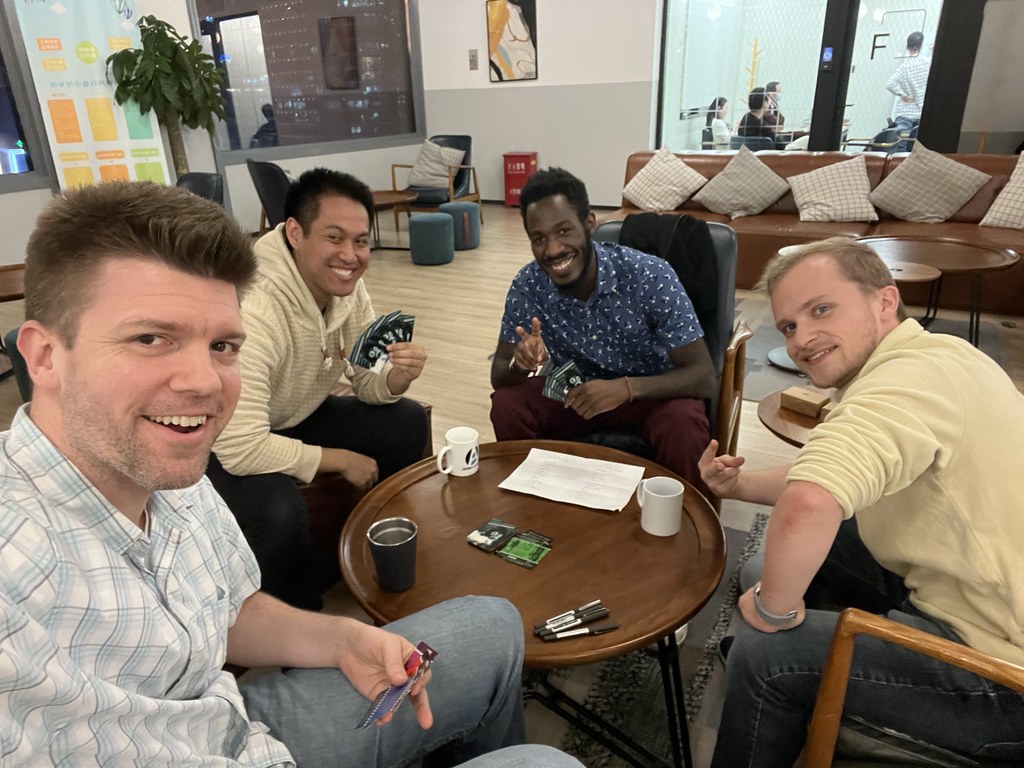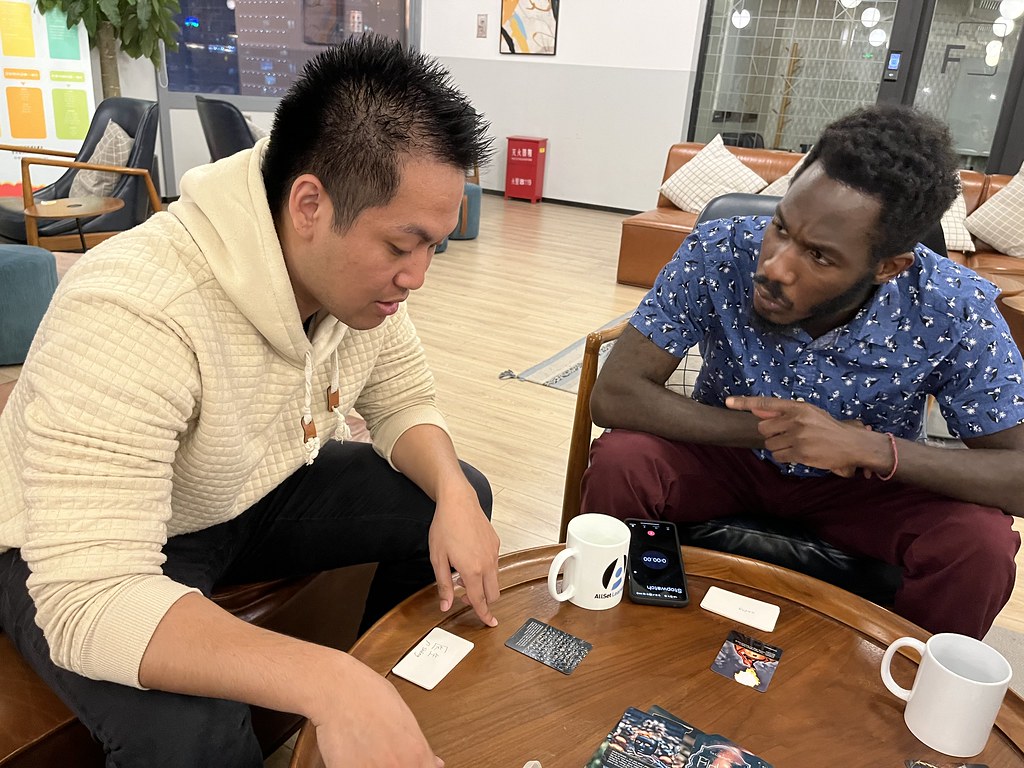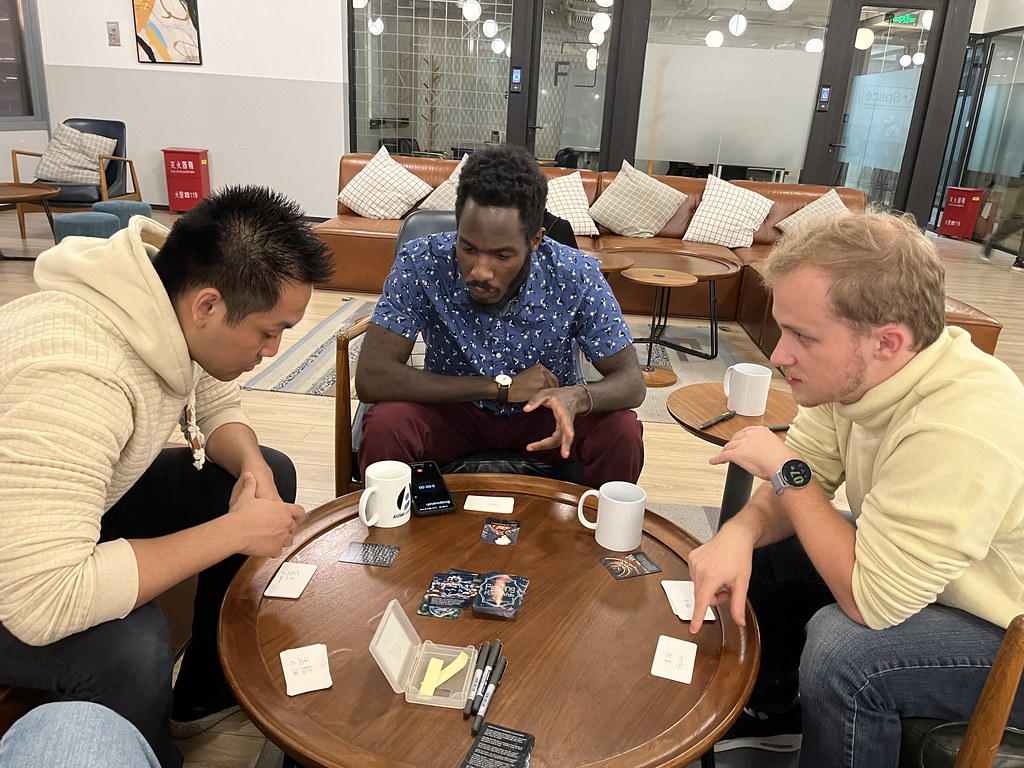Card Games for Language Learning
It was last year that I bought the card games Language Guardians 3 and Fighting Flashcards. It wasn’t until last week that I put together a group of people to test them out. It was a good time!
Thanks to Akeel for help organizing, and to Vaughn and David for joining in. Here’s our group in the AllSet Learning office lobby:

Game 1: Language Guardians
This game is sort of like Uno in that you have a number of colors (which correspond to language tasks) and a number of card types (which correspond to word categories). If you know Uno, this game is super easy to pick up.
I should note that the number is actually quite important, in that “Language Guardians 1” is meant for elementary-level players, whereas “Language Guardians 3” is much more advanced. We used a little “equivalency chart” so that we could mix the categories of 1 and 3, and different level players could all enjoy the same game.
So, for example, when the LG3 “monsters” card came up, an elementary-level player could sub in the LG1 category “animals.” It worked just fine. There was lots of learning from each other. Good times!
Game 2: Fighting Flashcards
This is the game I was most excited to try out because it plays kind of like Magic: the Gathering, except that each player has his own stack of flashcards to work through. When you’ve worked through your flashcard deck, you win!

At this point, we were running short on time. So for this one, I played “game master” in order to keep the game moving smoothly.

It was our first time playing the game, so we were still getting the feel for it, but the interplay between the game cards and the flashcards was super interesting. Over the course of the game, it became quite apparent how powerful some game cards were, and that you could adjust the “balance of power” between game cards and flashcards by omitting certain game cards from the deck.
Flashcard Considerations
The cool thing about Fighting Flashcards is that each player uses his own deck of cards. So by bringing the cards you’re working on, you customize the game to your own level, and players of different levels playing together is no problem. Pretty slick.
BUT, what if one player brings flashcards he already knows 90% of, and some other player ambitiously brings flashcards he only knows 40% of? Obviously, it’s not going to be a super fair match-up.
To compensate for this, I told the players they didn’t need to provide their own flashcards. I provided blank flashcards which we would use to make new flashcards right before the game started.

I provided some HSK word lists and AllSet Learning themed word lists, and each player was able to select a source of vocabulary which was both level-appropriate and interesting to him personally. Then, another player would choose words from a player’s list, providing some randomness and potential challenge. After quickly making 20 flashcards for each player, everyone had about 5 minutes to quickly review his own words before kicking off the game.
Igniting Imagination
As an educator and gamer, the part I loved most about this exercise was the way it ignites your imagination. The game instructions themselves encourage you to try different variations, use only certain cards for certain game types, etc. But just playing the games results in all kinds of ideas for twists on the games, ways to practice different language skills, ways to use flashcards, and so on.
One of the ideas we had when playing Fighting Flashcards was for each player to use his own phone to do electronic flashcards. But the game itself requires paper flashcards because it has multiple cards requiring you to shuffle your deck, or go through the flashcard discard pile, etc. So that didn’t work, but it’s not hard to imagine a variation of the game which would work with electronic flashcards (or maybe even a new flashcard app that supports games like this?).
Sure, anyone could create their own language learning games with pen and paper, but having these fully realized games in front of you really sets the stage so for quickly building on what’s already there with new ideas.
More Info on the Games
Full Disclosure: I got in touch with Matthew at LanguageCardGames.com before buying the card games, but I did buy them, and I don’t earn any kind of affiliate income from the links in this article. If you’re intrigued and have the means to do so, please support Matt and LanguageCardGames.com!
Also, since I didn’t go into gameplay much in this article, if you’re interested in learning more about how the games work, then definitely check out the website. Matthew has multiple gameplay videos on YouTube showing different games in action, and with different languages too.

What an honor to be featured here on Sinosplice! Thank you, John! And your creativity around the adaptations of the games has brought me fresh inspiration. Kudos to you for all your hard work on this incredible blog and wishing you all the best!
My pleasure! I love what you’re doing. Only sorry it took sooo long to get a gaming group together!